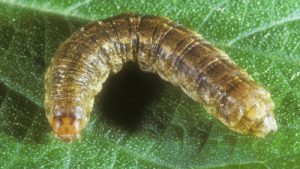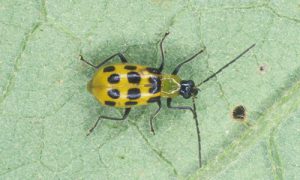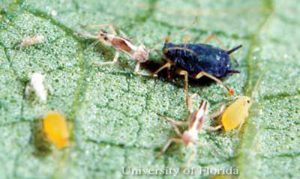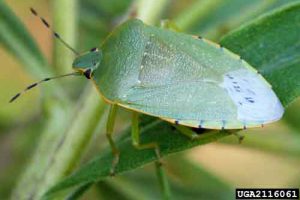Theresa Badurek, UF/IFAS Urban Horticulture Agent
Growing your own vegetables is a fun way to eat healthy and get outside for some fresh air and sunshine. Gardening can even save you money on your grocery bill! Florida is a great place to grow food because with our warmer temperatures you can garden just about year-round. But the heat and sometimes heavy rains can contribute to a host of vegetable garden pests. Some pests show up randomly while others show up time and again as if on schedule. There are also plenty of good bugs at work in the garden that you will want to protect. So, what’s a Florida gardener to do?
Just like planting a garden takes planning and preparation, a successful gardener also needs an insect management plan. This plan should include scouting your garden for problems early- when they are easier to deal with. What should you be looking for when scouting? You’ve got to know if a pest is harmful, helpful, or harmless before you react. There are pests that attack roots, stems, leaves, flowers, and fruits, and they might show up at any stage of growth, from seedling to mature plant. We will discuss these “bad” pest bugs according to the part of the plant that they attack. Then we’ll talk about how to cope!
Soil Pests

Gardens in former turfgrass areas are especially susceptible to soil dwelling insects. It is recommended that a new plot in a turf area be thoroughly tilled and kept clean and free of grass for 30+ days before planting vegetables. Adding organic matter (compost, composted manures, etc.) to the soil along with regular irrigation can also help. Common garden soil pests include: wireworms, cutworms, mole crickets, grubs, and lesser cornstalk borers.
Leaf Pests

Caterpillars are a major pest in a vegetable garden- and they can do a lot of damage if left unchecked. Many caterpillars found in the garden can be hand-picked and drowned in soapy water or squished- depending on a gardener’s preference. Armyworms can be reduced by planting crops like corn, beans, peas, potatoes, and tomatoes as early in the spring as possible, so don’t wait. If caterpillars get out of control you can use products containing Bt (Bacillus thuringiensis), which is a bacteria that kills caterpillars (keep away from butterfly gardens!)but is safe for people and even other “good” bugs. Bt is approved for use in organic gardens. Beetles can be hand-picked and destroyed, but this may need to be done continuously throughout the growing season. Common leaf and stem chewers include: armyworms, cabbage loopers, tomato hornworms, bean leafrollers, beetles, and leafminers.
Sucking Pests

Piercing/sucking pests have specialized mouthparts that they insert into a plant to suck out plant sap. This can reduce the vigor of your plants and generally stress them out. Some of these pests even transmit plant viruses from one plant to the next as they feed. Still others inject toxins into plants that cause abnormal or distorted growth. Aphids and spider mites can often be controlled with a sharp squirt of water from the garden hose- don’t blast the plant too hard though. Hand-pick and destroy stinkbugs and leaf-footed plant bugs. Severe infestations of these plant sucking pests may require the use of an insecticide such as a horticultural oil or soap. Be careful when using these pesticides as they will kill even the “good” bugs. Use only in targeted areas where the infestation exists. Common piercing/sucking garden pests include: aphids, leafhoppers, stinkbugs, leaffooted plant bugs, thrips, spider mites, and silverleaf whitefly.
Fruit Feeders

These are the most potentially frustrating group of pests in the vegetable garden- they eat your beautiful produce just when you are about to harvest! Planting early and harvesting as soon as you can will go a long way in preventing damage. For most pests prevention is the most important tool. Many fruit feeders are caterpillars that can be controlled using Bt mentioned in the leaf chewing pest section above. To be effective this must be done early and often- when blossoms first appear. Some common fruit feeders that may be a problem in the Florida garden include: corn earworms, pickleworms, cowpea curculios, pepper weevils, potato tuberworms, and stinkbugs.
Pest Management Tips for any Florida Garden
- Rotate crops each season.
- Till or plow the soil long before planting- and keep it free of weeds.
- Add organic matter such as compost or composted manures to your garden.
- Buy only insect, disease, and weed free transplants.
- Water and fertilize appropriately- too little water can stress plants and too much fertilizer can encourage pests.
- Monitor the garden daily or at least twice a week to catch problems early.
- Learn the “good” bugs and protect them.
- If you must treat with chemicals- even organic ones- spot treat only affected areas.
- Harvest crops as soon as they are ripe.
- Remove plants once they are no longer producing- or cut them down and plow them into the soil at the end of the season.
For information on protecting bees from pesticides: http://edis.ifas.ufl.edu/pdffiles/IN/IN102700.pdf
“Insect Management in the Home Garden” UF/IFAS Fact Sheet: http://edis.ifas.ufl.edu/pdffiles/VH/VH03600.pdf
 1
1
